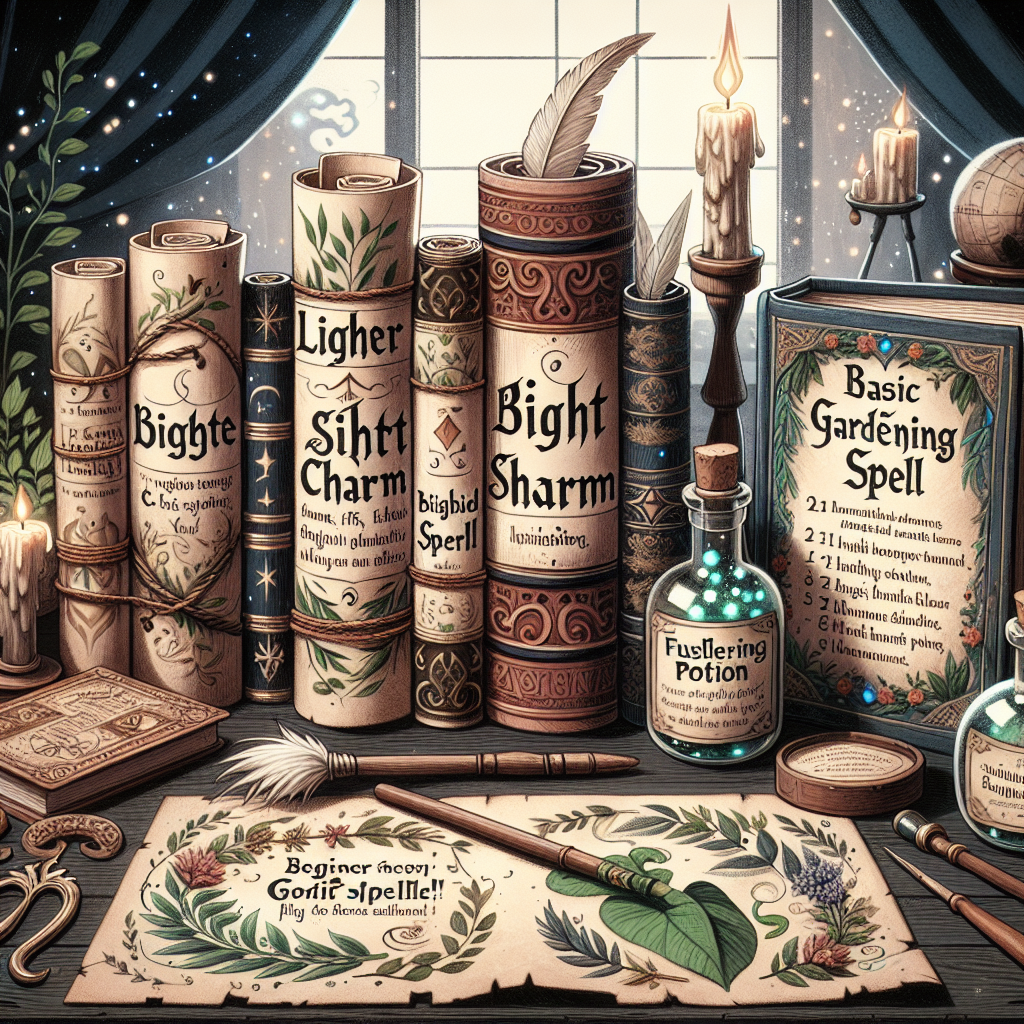As an Amazon Associate I earn from qualifying purchases.

The practice of casting spells dates back to the very origins of human civilizations, with evidence of spellwork found in ancient texts, artifacts, and structures from various cultures across the world. This practice is often seen as an intrinsic part of witchcraft, a diverse and often spiritual tradition that involves working with natural energies and forces to bring about change. Spells can range from simple affirmations to complex rituals, tailored to the intentions and desires of the practitioner.
For those beginning their journey into the realm of witchcraft and spellcasting, it is crucial to understand that this ancient art has evolved over thousands of years. Historically, witchcraft has been associated with both healing and harm, with spells being used for various purposes such as love, protection, health, and prosperity. During the medieval and early modern periods, witchcraft was often misunderstood and feared, leading to persecution and witch trials. However, in contemporary times, there's been a resurgence of interest in witchcraft as a form of spiritual expression and self-empowerment, with spells for beginners becoming more accessible through books, online resources, and community workshops.
An intriguing fact that draws many to the world of spellcraft is the belief that anyone can cast a spell. Indeed, one does not need to be a “born” witch or possess any supernatural gifts; rather, it is the intention and energy behind the spell that are deemed most important. As a beginner, it is tempting to dive into complex spells, but starting with simple spells enables the practitioner to build confidence, focus, and a deeper understanding of the underlying principles of their craft.
Engaging in the practice of spells requires more than just reciting words or performing actions. Beginners are often advised to develop their intuition, learn to connect with natural energies, and understand the ethical considerations involved in spellcasting. Being educated about the history, cultural significance, and potential impact of the spells one casts helps to create a respectful and meaningful practice. For instance, the law of return or the threefold law is a core belief in some witchcraft traditions, which suggests that the energy a practitioner puts out into the world, good or bad, will return to them threefold.
“`html
How Can Beginners Learn to Cast Spells and Begin Their Journey in Witchcraft?
“`
Embarking on the mystical path of witchcraft starts with mastering the basics of spellcasting. For beginners, spellcasting is an art form that involves channeling intention and energy to manifest personal transformation or influence the world around them. It draws upon the power of the elements, celestial bodies, herbs, crystals, and one's own spiritual energy. Starting with simple and focused spells allows budding witches to connect with their innate power and understand the ethical implications of their craft. As they grow in experience and knowledge, they can explore more complex rituals and spells. The key advantage of starting with introductory spells lies in building a strong foundational practice that ensures safety, respects nature, and aligns with the practitioner's intentions. Delve deeper into the world of witchcraft in the following sections, where we uncover the steps to casting your first spell and how to harness the energies of the universe responsibly.
Embarking on the path of witchcraft is a personal and spiritual journey that involves learning to harness the energies of the natural world. For those new to this realm, understanding and practicing spells for beginners is a pivotal step in cultivating your craft. Witchcraft doesn’t adhere to a singular doctrine, and thus, beginners often find that the array of traditions and practices can blend to suit their individual beliefs and lifestyles.
Understanding the Basics
Before delving into spellwork, it’s crucial for beginners to grasp some foundational concepts. Spellcraft is rooted in intention; it’s the focused will to bring about change. Spells can range from simple to complex, but for beginners, simplicity is key. Spells can be enhanced with various elements such as colors, herbs, crystals, and the moon's phases. Moreover, the Law of Threefold Return, a principle stating that whatever energy a person puts out into the world, be it positive or negative, will be returned to them three times over, is important to keep in mind when setting intentions.
Tools and Ingredients
Certain tools might be used to direct energy and represent the elements in spellwork. These can include an athame (a ceremonial blade), a wand, a pentacle, and a chalice. However, beginners don’t need to worry about having a full set right away. Focus more on common ingredients that are easily accessible and resonate with you. For instance, candles are a good starting point as they come in various colors which can correspond to different purposes: white for purification, green for prosperity, and red for love.
Visualization and Meditation
Visualization and meditation are key components of spellwork. Beginners should practice visualizing their goals as vividly as possible. Meditation helps in calming the mind, focusing intentions, and connecting to the energies around and within you. A clear and focused mind is a powerful tool in witchcraft.
As you start, simplicity should be your guiding principle. Here are a few spells that are appropriate for beginners:
**Candle Spell for Clarity**: Light a blue candle, focus on the flame, and meditate on a question or situation where you seek clarity. Imagine the light bringing you the answers you need.
**Herb Sachet for Protection**: Create a small sachet filled with protective herbs such as sage, salt, and rosemary. Charge it with your intention of safety and keep it with you or in your home.
**Crystal Charging for Healing**: Choose a crystal that corresponds with healing such as clear quartz or amethyst. Hold it in your hands, meditate on healing energy, and visualize this energy filling the crystal.
Timing Your Spells
The timing of spellwork can be influenced by many factors. One significant aspect is the lunar cycle. The new moon is often associated with beginnings, making it an optimal time for spells relating to new ventures or intentions. The full moon, on the other hand, is considered a time of heightened energy and is suitable for more potent spells or manifestations.
Ethics of Spellcasting
Ethical considerations are integral. It’s generally advised that spells should not aim to control or harm others. Instead, focus on spells that enhance your personal development, protection, healing, and positive growth.
Record-Keeping
Keeping a journal or a Book of Shadows to document your spells, experiences, and outcomes is an insightful practice. This record notifies progress, successful practices, and areas for improvement.
Statistics on Witchcraft and Spellcasting
Interest in witchcraft and spellcasting has surged in recent years. According to the Pew Research Center, about 0.4% of Americans, or approximately 1 to 1.5 million people, identify as Wiccan or Pagan. This growing community indicates a resurgence in the appeal and practice of witchcraft, and within that, a significant number of individuals are learning and incorporating spells for beginners into their spiritual practice.
Before casting your first spell, it's important to understand the basic principles of intention, focus, and belief. Research the components of the spell, such as herbs, colors, and moon phases, and ensure you are casting for positive and ethical reasons. Setting a clear intention and having a respectful approach to the energies you're working with is crucial for beginners.
While spellcasting is generally safe, the risks come from not fully understanding the intention behind the spell or using ingredients improperly. It is important to focus on positive intentions to avoid unintended consequences. Additionally, be aware of the physical properties of the materials you're using to avoid allergic reactions or other hazards.
As a beginner, it's helpful to follow spells as written to learn the structure and elements of spell work. However, as you grow more experienced, you can adapt spells to fit your needs and preferences, keeping the core intention clear and strong.
Consider what you wish to achieve with your spellcasting, whether it's love, protection, health, or abundance. Research spells that align with your intention and feel free to modify them to suit your specific desire. Pay attention to the components that resonate with you personally.
Yes, you can cast spells using only visualization and intention. Tools and ingredients can enhance and focus your energy, but they are not strictly necessary. Your personal power and clarity of thought are the most potent ingredients in any spell.
You may notice signs or changes related to your intentions in the following days or weeks. Keep in mind that results can be subtle and not always immediate. It's also important to take action towards your goals, as spells work in conjunction with your efforts. Be aware and open to opportunities that may arise as a result of your spellcasting.
Timing can be a crucial factor in spellcasting. Many practitioners use the phases of the moon, days of the week, and even specific hours to enhance the power of their spells. For example, a full moon is often considered a powerful time for spells related to completion or fruition. Research and plan accordingly, but also consider when you naturally feel most powerful.
The frequency of your spellcasting depends on your personal goals and how comfortable you feel with the practice. Some may cast spells daily as part to their routine, while others may do so only on specific occasions. It’s important to give yourself time to reflect on the outcomes of your spells before casting new ones.
No, you don't need to be part of a coven. Many practitioners are solitary witches and perform spells independently. However, joining a coven can provide guidance, community, and shared energy, which some find enhances their practice.
Anyone with the desire to learn can cast spells. It doesn’t require any innate special abilities, but rather a dedication to learning, understanding, and respecting the craft. Practice, patience, and an open mind are the key ingredients to becoming proficient in spellcasting.
Conclusion
Embarking on your witchcraft journey as a beginner involves understanding core concepts such as grounding, centering, and the significance of intent in spellcasting. Emphasis was placed on practical techniques for attaining focus and clarity, essential for effective spell work. By incorporating simple spells, beginners have learned to align their intentions with the natural energies that surround us. Ethical considerations and the Wiccan Rede's principle, “An it harm none, do what ye will,” have been highlighted to ensure that new practitioners approach their practice with respect and mindfulness. Additionally, the importance of personalizing spells, which makes the witchcraft experience more intimate and potent, has been underscoreed.
Tools and correspondences serve as guides for harnessing energies associated with various elements, days, and moon phases, thereby amplifying the power of spells. The guide covered the basics of crafting and casting spells, including choosing the right time, creating a sacred space, and selecting appropriate materials. Furthermore, the role of meditation, visualization, and affirmations in spellcasting adeptly prepares beginners to develop their own rituals. By gaining knowledge of herbs, crystals, and symbols, beginners can diversify their practice and discover the paths that resonate most deeply with them. As novices continue to explore and experiment within the realm of witchcraft, they are encouraged to maintain a record of their experiences in a Book of Shadows, fostering growth and reflection on their mystical journey.
Amazon and the Amazon logo are trademarks of Amazon.com, Inc, or its affiliates.


